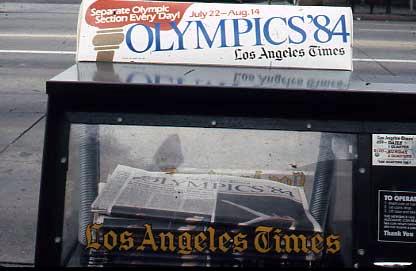
Submitted by Clare Arnstein on Tue, 20/09/2016 - 09:20
More than three decades after the boycotts of the Moscow and Los Angeles Olympics, athletes, archivists and experts will gather at a conference at Cambridge, 19-21 September to compare notes on what really happened.
More than three decades after the boycotts of the Moscow and Los Angeles Olympics, athletes, archivists and experts will gather at a conference at Cambridge this September (2016) to compare notes on what really happened.
The three-day conference, Battling Boycotts – The Olympics and the Second Cold War, will be held from September 19 to 21. With keynote academic speakers drawn from around the world, it will be a comprehensive re-examination of the two “Boycott Olympics” – Moscow 1980 and Los Angeles 1984.
Contributors will include a former CIA officer, senior archivists from Moscow and Los Angeles Olympics legacy curators, promising expert analysis of the political and strategic aims of the two main players, the political landscape that led to the boycott option being exercised and how the organisers staged the two Games anyway and then proclaimed both a triumph.
The Cambridge conference will re-examine the accepted historical views, such as:
- That the Eastern Bloc’s boycott of the LA Games was a tit-for-tat response to the West staying away from Moscow.
- Western media’s claims that the Eastern Bloc was united. In reality, there was a deadly rivalry between the USSR and its East German satellite.
- The conference will also consider perspectives from Tallinn and Kiev, now capitals of Estonia and Ukraine but then part of the Eastern Bloc.
Conference organiser Professor Chris Young, author of a seminal book about the 1972 Munich Olympics and co-director of the international academic project ‘The Global History of Cold War sport’ said:
"The twin Olympic boycotts of 1980 and 1984 are at the heart of what historians have called the second Cold War. With detente clearly unravelling, 1983 was probably the most dangerous year on the world stage since the Cuban Missile crisis. Our conference assembles experts from around the world to consider what sport meant at this critical juncture in 20th Century history, at the most important set of Olympics since Berlin 1936 and until Beijing 2008."
Key speakers will include David Goldblatt, winner of the 2015 William Hill Sports Book of the Year and author of the latest History of the Olympics (2016); John Pritchard, GB rowing captain in 1980, and former Chairman of the British Olympic Association; Paul Corthorn of Queen’s University, Belfast, who will discuss Team GB’s defiance of Margaret Thatcher’s order for them not to go to Moscow in 1980 and Robert Edelman (University of California, San Diego) on the Soviet boycott of LA 1984.
The 1980 and 1984 boycotts had far-reaching implications. Political deals were struck to ensure important nations turned up at the Seoul Games, despite the shooting down in 1983 of a Korean airliner with 269 people on board.
If the LA Games heralded the end of the Boycott Olympics, Seoul 1988 ushered in a new era: the Chemical Olympics and the rise of China as a significant sporting nation.
The conference at Pembroke College, University of Cambridge, is organised by Professor Chris Young, historian of German sports history (1920 – present) and author of a book about the Munich Olympics. It is the third in the series ‘The Global History of Sport in the Cold War’ which has an accompanying podcast series downloadable free on iTunes at https://t.co/AvOJBJARIK
The conference can be followed on Twitter via #ColdWarSport
